Fostering Ownership of Childhood Immunization Data in Democratic Republic of Congo
Imagine having to balance your check book to decide if you could afford to make a major purchase if you had no idea of how much money you have in your account or how much you’ve spent. The best you can do is guess. In order to effectively balance your check book and make your purchase, you need accurate information (data). In the same way, immunization programs need accurate and timely data to make effective programmatic decisions.
| Rank | Country | Number Unimmunized |
|---|---|---|
| 1 | India | 7,225,120 |
| 2 | Nigeria | 3,048,560 |
| 3 | Indonesia | 1,574,350 |
| 4 | Ethiopia | 1,194,130 |
| 5 | Pakistan | 883,600 |
| 6 | DRC | 764,400 |
| 7 | Philippines | 458,600 |
| 8 | Afghanistan | 409,700 |
| 9 | Chad | 342,420 |
| 10 | South Africa | 281,680 |
Democratic Republic of Congo (DRC) ranks among the 10 countries with the highest number of unimmunized children. Years of civil strife have weakened DRC’s immunization program. Improvements in the quality of data are needed by managers to prioritize, plan actions, and make the program more effective and cost efficient. If you ask Karen Wilkins, a veteran of CDC’s Global Immunization Division, she’ll be glad to tell you, “Data quality is central to what CDC has to offer.”
To improve the data, WHO, UNICEF, and CDC created an official group of national immunization leaders and taught them a systematic way to monitor their program data. Beginning in August 2012, the Strengthening the Quality and Use of Immunization Data, or SQUID team, traveled to the DRC to establish a National Expert Group (NEG) on data quality. The NEG was comprised primarily of immunization program staff from the Ministry of Health (MOH) and technical representatives from the WHO and UNICEF. The NEG learned a technique to assess how immunization data is collected, recorded, reported, and analyzed at each level of the health system. A coordination committee with representatives from the MOH, WHO and UNICEF, helped plan and facilitate all activities related to this initiative.
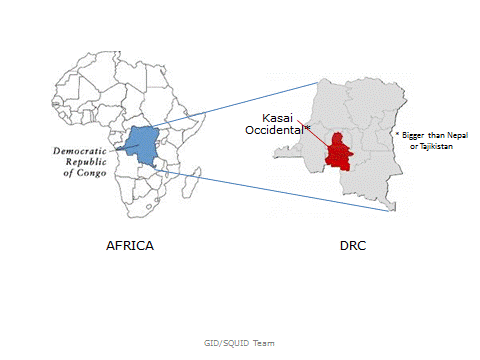
Map of Democratic Republic of Congo (DRC), highlighting the area where field activities took place, Kasai Occidental Province, which is larger than Nepal or Tajikistan
After the training, the NEG used the technique to conduct assessments in Kasai Occidental Province. After completing the assessment, SQUID returned to DRC for a debriefing workshop with the NEG to discuss their experiences.
Several members of the expert group told CDC that the project provided a truly eye-opening experience for them since they had not had similar trainings or opportunities before. They reported that they got to learn the real challenges in recording and reporting of quality immunization data at the frontline of health care.
For Daline Derival, one of the SQUID Team’s epidemiologists, “The most fulfilling aspect of the series of activities was being able to facilitate the opportunity for national level staff (who rarely, if ever, venture into the regions) to travel to some remote health districts and health centers to see where immunization data comes from.”
These activities also provided the SQUID team with learning and growth opportunities. Chung-Won Lee, the SQUID Team Lead, learned that “when it comes to immunization data in resource-limited settings, there is a significant gap between the assumptions made at the national and international levels and the realities on the ground. It is critical for the program leaders to observe, examine, and learn the real-life situations in the field to plan and implement meaningful policies.”
According to Chung-Won, “This project offered a much needed opportunity for the DRC’s national leaders to systematically assess the field situations to use the findings to make good decisions. For me, this was a very gratifying experience because I saw the eyes of the national expert group members sparkling when they returned from the field activities. There was undeniable passion and enthusiasm when they reported on the basic yet widely prevalent challenges in the field and how they thought they should be tackled.”
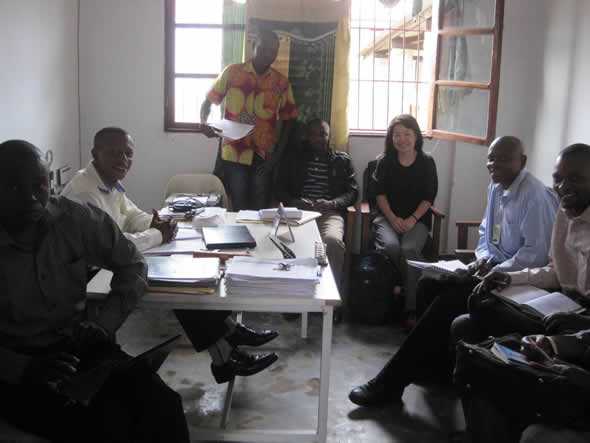
CDC’s Chung-won Lee with members of the National Expert Group on Data Quality and health staff in Lukonga, Kasai Occidental during a post-data quality assessment debriefing session. Photo courtesy of Daline Derival/CDC.
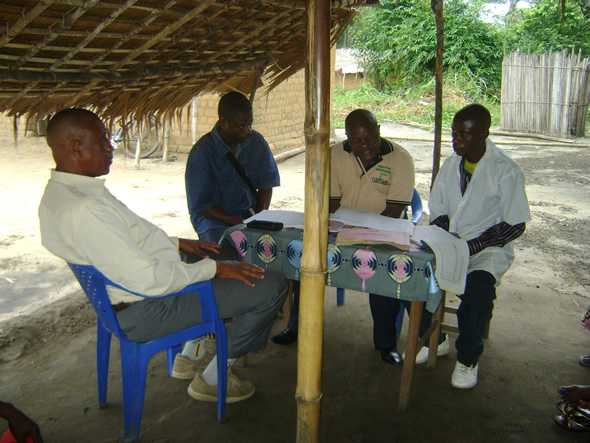
DRC National Expert Group on Immunization Data Quality Members conducting a data quality interview in Kasai Occidental. Photo courtesy of Daline Derival/CDC.
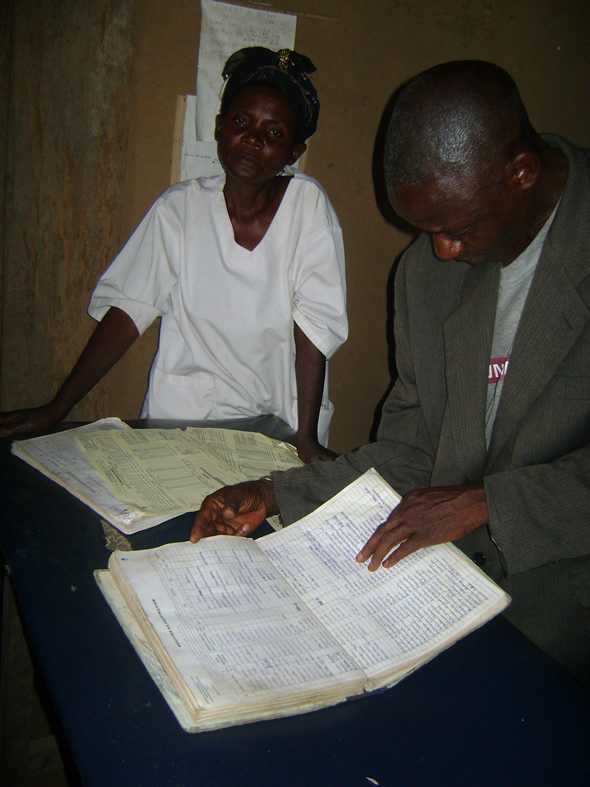
DRC National Expert Group on Immunization Data Quality Member reviewing a child immunization register in Kasai Occidental. Photo courtesy of Daline Derival/CDC.
- Page last reviewed: January 27, 2014
- Page last updated: January 27, 2014
- Content source:
Global Health
Notice: Linking to a non-federal site does not constitute an endorsement by HHS, CDC or any of its employees of the sponsors or the information and products presented on the site.


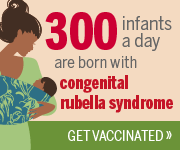
 ShareCompartir
ShareCompartir